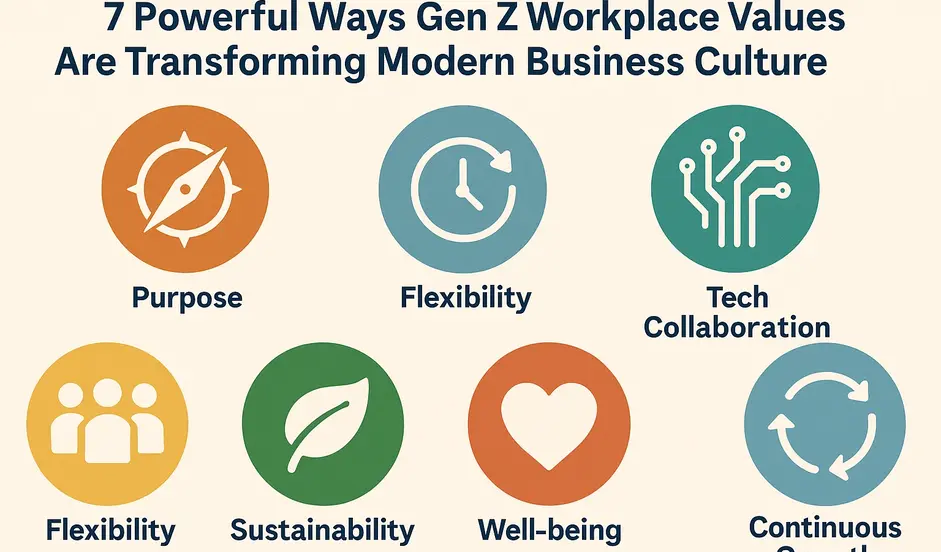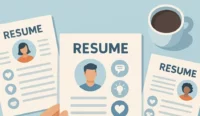In today’s rapidly evolving professional landscape, understanding Gen Z workplace values has become essential for organizations aiming to attract and retain top talent. Born between 1996 and 2012, Generation Z is already making significant waves in the business world, with projections showing they’ll constitute 30% of the global workforce by 2030.
Unlike previous generations, Gen Z brings distinct characteristics and expectations to their professional lives. Their unique approach to work-life balance, communication, and corporate responsibility is reshaping traditional workplace norms and challenging companies to adapt or risk falling behind in the talent acquisition race.
Table of Contents
Understanding the Gen Z Professional Identity
Gen Z represents the first truly digital native generation entering the workforce. Having grown up with smartphones, social media, and instant access to information, their approach to professional life differs significantly from their predecessors.
Who Exactly Is Generation Z?
While exact birth years vary slightly depending on different researchers, Generation Z is generally accepted to include individuals born between 1996 and 2012. This means the oldest Gen Z professionals are now approximately five years into their careers, with many more entering the workforce each year.
What distinguishes this generation is not just their age but their formative experiences. They witnessed the 2008 financial crisis, grew up during climate change awareness movements, and experienced a global pandemic during their formative educational or early career years. These events have profoundly shaped their worldview and professional expectations.
Key Characteristics Defining Gen Z Professionals
Gen Z brings several distinctive traits to the workplace that employers should recognize:
- Passion-driven work ethic: They invest deeply in projects and causes they believe in
- Value-centric decision making: Corporate ethics and social responsibility heavily influence their employment choices
- Digital fluency: Natural aptitude with technology and adaptation to new digital tools
- Learning agility: Strong desire for continuous skill development and growth opportunities
- Transparent communication style: Preference for direct, authentic workplace conversations
The Value-Centric Approach to Career Decisions
Perhaps the most defining characteristic of Gen Z professionals is their strong alignment between personal values and career choices.
Corporate Social Responsibility as a Decision Factor
For Gen Z, a company’s stance on environmental sustainability, diversity and inclusion, and social justice isn’t just a nice-to-have—it’s often a dealbreaker. According to research by Deloitte, nearly 50% of Gen Z employees have made career decisions based on personal ethics.
This generation carefully evaluates potential employers’ commitments to:
- Environmental sustainability initiatives
- Diversity, equity, and inclusion policies
- Community engagement and social impact
- Ethical business practices and transparency
- Employee wellbeing programs
Authentic Brand Alignment
Gen Z professionals can quickly detect when a company’s stated values don’t match their actions. They expect consistency between marketing messages, public statements, and internal practices.
“Gen Z is very in tune with what their employers are doing and facing in the world, sort of how they’re branding themselves,” notes workplace culture expert Emma Reynolds. “They’re extremely value-centric in their approach to career decisions.”
Debunking Common Misconceptions About Gen Z Workers
Despite their growing presence in the workplace, Gen Z professionals often face stereotypes that don’t accurately reflect their capabilities and attitudes.
The Communication Myth
One persistent misconception is that Gen Z lacks professional communication skills due to their digital upbringing and preference for text-based interactions.
“A common misconception about Gen Z is that they really struggle to communicate and don’t know how to communicate professionally or exhibit traits of professionalism in the world of work,” explains workplace researcher Dr. Michael Chen. “I simply don’t think that’s true. Gen Z is super transparent and communicative, which is a new way of communicating that’s getting into the workplace and becoming a new norm.”
Rather than lacking communication skills, Gen Z often brings:
- Directness and transparency in feedback
- Comfort with digital collaboration tools
- Ability to communicate concisely
- Preference for authentic over formal communication
- Skill in visual and multimedia communication
The “Lazy Generation” Stereotype
Perhaps the most damaging misconception is the characterization of Gen Z as the “lazy generation,” often associated with concepts like “quiet quitting” that gained popularity on social media platforms like TikTok.
In reality, Gen Z isn’t rejecting hard work—they’re rejecting unsustainable work practices. Their approach represents a healthy boundary-setting that prioritizes wellbeing alongside productivity. They’re advocating for:
- Reasonable work expectations
- Mental health awareness
- Fair compensation for their contributions
- Clear boundaries between work and personal life
- Purpose-driven work that aligns with their values
As workplace psychologist Dr. Sarah Williams explains: “What older generations might view as laziness is actually Gen Z establishing healthy boundaries. They’re not willing to sacrifice their mental health for a job, and that’s actually a positive development in workplace culture.”

How Gen Z is Reshaping Workplace Learning and Development
With their inherent curiosity and comfort with technology, Gen Z is transforming how organizations approach training and professional development.
The Continuous Learning Mindset
Unlike previous generations who might view learning as a discrete activity with a clear endpoint, Gen Z approaches skill development as an ongoing, lifelong process. They expect employers to support their growth through:
- Microlearning opportunities integrated into daily work
- Access to digital learning platforms and resources
- Regular feedback and coaching conversations
- Cross-functional exposure and project rotation
- Support for external learning opportunities
Technology-Enhanced Skill Building
As digital natives, Gen Z professionals leverage technology for learning in ways previous generations might not consider:
- YouTube tutorials and video-based learning
- Mobile learning apps and gamified training
- Virtual reality simulations for skill practice
- Social learning through online communities
- AI-powered personalized learning paths
Organizations that embrace these learning preferences gain a competitive advantage in attracting and developing Gen Z talent. According to LinkedIn Learning, companies that provide robust learning opportunities see 30-50% higher retention rates among younger employees.
Hiring Gen Z Talent?
Connect with motivated Gen Z professionals who bring fresh perspectives and digital expertise to your organization. WhatJobs offers free job posting services to help you build a diverse, multi-generational workforce.
Post Jobs for Free on WhatJobs →The Work-Life Balance Revolution
Perhaps the most significant impact Gen Z is having on workplace culture involves redefining the relationship between professional and personal life.
Beyond Quiet Quitting: Establishing Healthy Boundaries
The term “quiet quitting” gained popularity in 2022 when TikTok creator Brian Creely used it to describe doing exactly what your job requires without going above and beyond. While some criticized this as laziness, Gen Z embraced it as a form of boundary setting.
“It’s really about not being so dedicated to and stressed about work to the point that it’s all-consuming, to the point that it’s really impacting our mental health, to the point that it’s becoming unbearable to even think about a future of work or a really solid career for ourselves,” explains workplace wellbeing consultant Jasmine Taylor.
This boundary-setting manifests in several ways:
- Declining meetings outside working hours
- Using all allocated vacation time
- Avoiding constant email checking during personal time
- Requesting mental health days when needed
- Seeking flexible work arrangements
The Emphasis on Workplace Wellbeing
For Gen Z, workplace wellbeing isn’t just about physical health but encompasses mental, emotional, and financial wellness. They expect employers to support them holistically through:
- Mental health resources and support
- Financial wellness education
- Flexible working arrangements
- Reasonable workloads and deadlines
- Recognition of achievements
Organizations that prioritize employee wellbeing see significant returns in productivity, retention, and innovation—making this Gen Z priority beneficial for businesses as well.
Intergenerational Collaboration: The Path Forward
As Gen Z’s presence in the workforce grows, successful organizations will be those that facilitate productive collaboration across generational lines.
Learning From Each Other
Each generation brings valuable perspectives to the workplace:
- Baby Boomers offer institutional knowledge and industry expertise
- Gen X provides pragmatic leadership and adaptability
- Millennials bring technological comfort and collaborative approaches
- Gen Z contributes digital fluency and fresh perspectives
“I’m really excited about how those fits can start to change and take shape and really influence other generations as we start to work intergenerationally and our younger workforce builds as some of our older workforce starts to leave,” notes organizational development specialist Marcus Johnson.
Creating Multi-Generational Teams
Organizations can foster intergenerational collaboration through:
- Reverse mentoring programs pairing younger and older employees
- Cross-generational project teams
- Shared learning opportunities
- Recognition of different communication preferences
- Celebration of diverse perspectives and approaches
Companies that successfully integrate Gen Z with other generations create robust, innovative workplaces capable of addressing complex business challenges from multiple perspectives.
Need Career Advice?
Whether you’re a Gen Z professional entering the workforce or a manager looking to better understand generational differences, personalized guidance can make all the difference.
Explore Career Resources →The Future of Work: Gen Z’s Lasting Impact
As Gen Z continues to enter and advance in the workforce, their influence on workplace culture will only grow stronger. Organizations that embrace their values and perspectives position themselves for long-term success.
Adapting Recruitment and Retention Strategies
To attract and retain Gen Z talent, organizations should consider:
- Highlighting authentic corporate values and social impact
- Offering continuous learning and development opportunities
- Providing flexibility in work arrangements
- Creating transparent career advancement pathways
- Supporting holistic employee wellbeing
Embracing Technological Transformation
Gen Z’s digital fluency will accelerate workplace technological adoption:
- AI and automation integration
- Enhanced digital collaboration tools
- Mobile-first workplace applications
- Data-driven decision making
- Virtual and augmented reality applications
Organizations that leverage Gen Z’s technological comfort will gain competitive advantages in innovation and efficiency.
FAQ: Understanding Gen Z Workplace Values
How are Gen Z workplace values different from millennial workplace values?
While both generations value purpose-driven work and work-life balance, Gen Z workplace values tend to be more focused on financial security, practical career advancement, and mental health awareness. Unlike millennials who often sought meaning through work itself, Gen Z is more likely to separate their identity from their career while still demanding ethical practices from employers. Gen Z also demonstrates greater comfort with technology, higher expectations for diversity and inclusion, and more emphasis on transparent communication than their millennial counterparts.
What benefits and perks do Gen Z professionals value most in the workplace?
When it comes to Gen Z workplace values, financial benefits like competitive salaries and student loan assistance rank highly, but they’re just the beginning. Mental health support, including therapy services and wellness days, is particularly important to this generation. Flexible work arrangements that allow for work-life integration are essential, as are continuous learning opportunities through tuition assistance and professional development programs. Gen Z also highly values companies with strong sustainability initiatives and diversity programs that align with their personal values.
How can managers effectively provide feedback to Gen Z employees?
Understanding Gen Z workplace values means recognizing their preference for regular, direct feedback rather than traditional annual reviews. Managers should provide specific, actionable guidance in real-time through digital channels when appropriate, while scheduling brief in-person check-ins for more substantive discussions. Focus feedback on both strengths and growth areas, and explicitly connect performance to larger purpose and impact. Gen Z appreciates transparency about career progression, so clarify how current projects contribute to their professional development and advancement opportunities.
How is Gen Z influencing remote and hybrid work policies?
Gen Z workplace values are significantly reshaping remote work expectations, with this generation advocating for flexibility while still valuing in-person collaboration opportunities. Unlike the stereotype that Gen Z wants to work entirely remotely, research shows they often prefer hybrid arrangements that combine independent work with meaningful team interaction. They’re driving the adoption of digital collaboration tools, asynchronous communication practices, and results-based performance metrics rather than time-based evaluation. Companies embracing these changes are seeing improved recruitment success and retention rates among Gen Z professionals.
Find jobs aligned with your values on WhatJobs – Browse thousands of opportunities that respect work-life balance and ethical practices.






